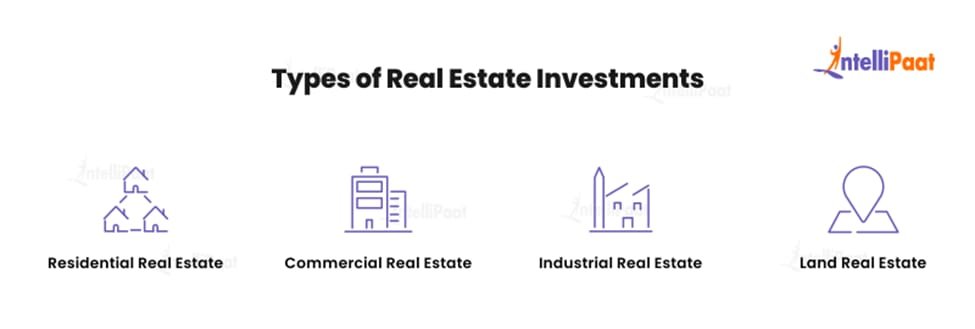Understanding the Basics of REAL ESTATE INVESTING

Before diving into the tips, it’s important to understand the basic principles of real estate investing. Real estate investment involves purchasing property to earn a return on the investment through rental income, appreciation, or both. There are various types of real estate investments, including residential, commercial, industrial, and land.
Types of Real Estate Investments

- Residential Real Estate: This includes single-family homes, multi-family homes, condominiums, and townhouses. Investors can earn income through renting properties or selling them at a higher price.
- Commercial Real Estate: This category includes office buildings, retail spaces, warehouses, and industrial properties. Commercial properties often have longer lease agreements and can provide stable cash flow.
- Industrial Real Estate: These properties include factories, warehouses, and distribution centers. They are usually leased to companies involved in manufacturing, storage, or distribution.
- Land: Investing in undeveloped land can be lucrative, especially if the land appreciates in value or if it is developed into residential or commercial property.
Key Concepts In Real Estate Investing
- Cash Flow: The net income from a property after all expenses are paid. Positive cash flow means the property is generating more income than it costs to own and operate.
- Appreciation: The increase in property value over time. Appreciation can provide significant returns when the property is sold.
- Leverage: Using borrowed capital to increase the potential return on investment. Real estate investors often use mortgages to purchase properties.
- Equity: The difference between the property’s market value and the amount owed on the mortgage. Building equity is a key goal for real estate investors.
Tips for Success in Real Estate Investing
1. Conduct Thorough Market Research

Understanding the real estate market is crucial for making informed investment decisions. Here are some key aspects to consider:
- Local Market Conditions: Analyze the economic factors affecting the local real estate market, such as employment rates, population growth, and local amenities. A thriving local economy often leads to increased property values and rental demand.
- Neighborhood Analysis: Evaluate the specific neighborhoods where you plan to invest. Look for areas with good schools, low crime rates, and proximity to transportation and shopping centers.
- Property Values and Trends: Study historical property values and trends in the area. Understanding past market performance can help predict future trends.
- Rental Market Analysis: Investigate the rental market in the area, including average rental rates, occupancy rates, and tenant demand.
2. Develop a Clear Investment Strategy

Having a well-defined investment strategy is essential for success. Here are some common strategies to consider:
- Buy and Hold: This strategy involves purchasing properties and holding them for an extended period, allowing them to appreciate in value while generating rental income.
- Fix and Flip: Investors purchase distressed properties, renovate them, and sell them at a higher price. This strategy requires a keen eye for property potential and strong project management skills.
- Wholesaling: Wholesalers contract properties at a low price and then sell the contract to another investor for a fee. This strategy requires excellent negotiation skills and a network of buyers.
- Real Estate Investment Trusts (REITs): For those who prefer a hands-off approach, investing in REITs allows you to invest in a portfolio of properties managed by professionals.
3. Secure Financing

Financing is a critical component of real estate investing. Here are some financing options to consider:
- Traditional Mortgages: Conventional loans from banks or mortgage lenders are a common way to finance real estate investments. These loans typically require a down payment and have fixed or adjustable interest rates.
- Hard Money Loans: These are short-term loans provided by private lenders. Hard money loans are often used for fix-and-flip projects and have higher interest rates and shorter repayment terms.
- Private Money Loans: Borrowing from private individuals, such as friends, family, or other investors, can be a flexible financing option.
- Seller Financing: In some cases, the property seller may agree to finance the purchase, allowing the buyer to make payments directly to the seller.
4. Perform Due Diligence(Carefully Investing)

Thorough due diligence is essential to avoid costly mistakes. Here are some steps to take:
- Property Inspection: Hire a professional inspector to evaluate the property’s condition. This can reveal potential issues that may affect the property’s value or require expensive repairs.
- Title Search: Ensure that the property has a clear title with no outstanding liens or legal issues. A title company can perform this search and provide title insurance.
- Financial Analysis: Perform a detailed financial analysis, including cash flow projections, expense estimates, and potential return on investment.
- Legal Considerations: Consult with a real estate attorney to understand the legal aspects of the investment, including zoning laws, property taxes, and landlord-tenant regulations.
5. Build a Professional Network

Successful real estate investors often rely on a network of professionals to help them navigate the complexities of the market. Here are some key contacts to consider:
- Real Estate Agents: A knowledgeable real estate agent can help you find properties, negotiate deals, and understand market trends.
- Property Managers: If you plan to hold rental properties, a property manager can handle tenant relations, maintenance, and rent collection.
- Contractors and Handymen: Reliable contractors are essential for property renovations and repairs.
- Accountants: An accountant can help you manage your finances, tax planning, and investment analysis.
- Attorneys: A real estate attorney can assist with contracts, legal disputes, and regulatory compliance.
6. Focus on Location

The location of a property is one of the most important factors affecting its value and potential for appreciation. Here are some tips for choosing the right location:
- Economic Growth: Look for areas with strong economic growth, as this often leads to increased property values and rental demand.
- Infrastructure Development: Areas with planned infrastructure projects, such as new highways, public transportation, and commercial developments, can experience significant appreciation.
- Neighborhood Quality: Invest in neighborhoods with good schools, low crime rates, and desirable amenities. These factors attract tenants and buyers, increasing property demand.
- Future Potential: Consider the long-term potential of the area. Emerging neighborhoods with signs of gentrification can offer substantial returns.
7. Understand the Risks

Real estate investing comes with its own set of risks. Being aware of these risks and having a plan to mitigate them is crucial:
- Market Risk: Real estate markets can be volatile and subject to economic cycles. Diversifying your portfolio and investing in stable markets can help reduce this risk.
- Property Risk: Each property carries its own risks, such as structural issues, maintenance costs, and tenant turnover. Performing thorough due diligence can help identify and mitigate these risks.
- Financing Risk: Changes in interest rates and financing terms can affect your cash flow and profitability. Consider fixed-rate mortgages and maintain a strong credit profile.
- Legal and Regulatory Risk: Changes in zoning laws, property taxes, and rental regulations can impact your investment. Stay informed about local laws and consult with legal professionals.
8. Manage Properties Effectively

Effective property management is essential for maintaining profitability and ensuring tenant satisfaction. Here are some property management tips:
- Tenant Screening: Conduct thorough background checks on prospective tenants to ensure they have a stable income and a good rental history.
- Lease Agreements: Use comprehensive lease agreements that clearly outline the terms and conditions of the rental. This can help prevent disputes and protect your interests.
- Maintenance and Repairs: Regularly maintain the property and address repairs promptly to keep the property in good condition and avoid costly issues.
- Rent Collection: Implement a reliable rent collection system and enforce late fees to ensure consistent cash flow.
- Communication: Maintain open and effective communication with tenants to address their concerns and foster a positive landlord-tenant relationship.
9. Keep Learning and Adapting

The real estate market is constantly evolving, and successful investors stay informed and adapt to changes. Here are some ways to continue learning:
- Education: Attend real estate seminars, workshops, and online courses to stay updated on market trends and investment strategies.
- Networking: Join real estate investment groups and associations to connect with other investors and share knowledge and experiences.
- Reading: Read books, blogs, and articles on real estate investing to gain insights and learn from successful investors.
Mentorship: Seek out mentors who have experience in real estate investing and can provide guidance and advice
10. Plan for the Long Term

Real estate investing is a long-term endeavor, and having a clear plan for the future is essential. Here are some long-term planning tips:
- Set Goals: Define your investment goals, such as income targets, property acquisition plans, and timelines. This will help you stay focused and measure your progress.
- Exit Strategy: Have a clear exit strategy for each investment, whether it’s selling the property, refinancing, or passing it on to heirs.
- Financial Planning: Develop a financial plan that includes budgeting, tax planning, and retirement goals. Working with a financial advisor can help you create a comprehensive plan.
- Diversification: Diversify your real estate portfolio by investing in different types of properties and markets. This can help reduce risk and increase potential returns
Some Additional Tips:-
1. Traditional Mortgages

Traditional mortgages are one of the most common ways to finance real estate investments. These loans are typically provided by banks, credit unions, and other financial institutions. Key features of traditional mortgages include:
- Fixed or Adjustable Interest Rates: Fixed-rate mortgages have constant interest rates for the life of the loan, providing predictable monthly payments. Adjustable-rate mortgages (ARMs) have interest rates that can change periodically based on market conditions.
- Amortization Periods: Common amortization periods range from 15 to 30 years. Longer terms result in lower monthly payments but more interest paid over the life of the loan.
- Down Payments: Lenders usually require a down payment of 20-25% for investment properties, although this can vary.
Pros:
- Predictable payments with fixed-rate options
- Potentially lower interest rates compared to other financing options
- Longer repayment terms
Cons:
- Stricter qualification criteria
- Larger down payment required
- Lengthy approval process
2. Hard Money Loans

Hard money loans are short-term loans provided by private lenders, often used for fix-and-flip projects or other short-term investments. These loans are secured by the property itself rather than the borrower’s creditworthiness.
Pros:
- Quick approval and funding process
- Less stringent qualification criteria
- Flexible terms tailored to the specific investment
Cons:
- Higher interest rates compared to traditional mortgages
- Shorter repayment terms (usually 1-3 years)
- Higher fees and closing costs
3. Private Money Loans

Private money loans come from private individuals rather than financial institutions. These individuals could be friends, family members, or other investors looking to earn a return on their capital.
Pros:
- Flexible terms and conditions
- Potential for lower interest rates depending on the lender
- Quick access to capital
Cons:
- Risk of personal relationships being affected by financial arrangements
- Less formalized process may lead to misunderstandings
- Typically require a strong network of potential lenders
5. Home Equity Loans and Lines of Credit (HELOC)

For investors who already own property, home equity loans and home equity lines of credit (HELOC) can be a way to leverage the equity in their existing properties to finance new investments.
Home Equity Loan: A lump sum loan based on the equity in your home, with fixed interest rates and monthly payments.
HELOC: A revolving line of credit based on the equity in your home, with variable interest rates and flexible repayment terms.
Pros:
- Lower interest rates compared to other types of loans
- Flexible use of funds
- Can be a good option for financing multiple properties over time
Cons:
- Puts your primary residence at risk if you default
- Variable rates on HELOCs can lead to unpredictable payments
- Requires significant equity in an existing property
Conclusion
Selecting the right financing option is crucial for real estate investing success. Each option has its own set of advantages and disadvantages, and the best choice depends on your financial situation, investment strategy, and risk tolerance. By understanding these various financing options, you can make informed decisions that align with your investment goals and help you build a successful real estate portfolio.
For BUYING KITCHEN UTENSILS-CLICK HERE
Follow Our Youtube Channel-CLICK HERE
FOLLOW OUR FACEBOOK PAGE-CLICK HERE
FOLLOW OUR FACEBOOK GROUP-CLICK HERE